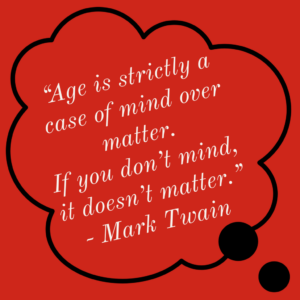Healthy Aging Part 4: Positive Attitude
by Robin Bush, ISR Communications
“There is a fountain of youth: it is your mind, your talents, the creativity you bring to your life and the lives of people you love. When you learn to tap this source, you will truly have defeated age.” – Sophia Loren
If you gather ten centenarians in a room and ask, “What is your secret to longevity?” you may hear:
“I put a shot of whisky in my coffee once in a while just like my grandmother did, and she lived to be 110.”
“I walk every day, no matter what the weather.”
“I spend every morning at the children’s center reading to the little ones.”
“I eat an apple a day – it works. Just look at me. I am 103!”
“I stopped worrying 50 years ago, and now I just think about things that make me laugh.”
“I believe in being happy. Nothing else matters.”
Their answers might not be your fountain of youth, but research shows one thing that can be — a positive attitude. It helps people have a healthy, longer life, gaining as much as seven years with a 40% reduced risk of dementia. (Becca Levy, Ph.D. Yale School of Public Health social psychologist).
What does a positive attitude look like? When we spend decades absorbing all our culture’s negative ageist attitudes, we begin to embody them. You can reverse that if you shift your focus to believing you will remain vigorous and seek people and things that make you happy. Although happiness is one component of a positive attitude, it doesn’t mean you need to smile at every challenge of aging; instead, it means believing you can deal with adversity. It’s keeping things in perspective.
Perspective means understanding what you can no longer do while focusing on being grateful for what you can do. Every time you have a negative thought about what you cannot do, write it down. Then write something next to it that you can do. You can’t eliminate the challenges of aging, so refocus your thinking and come up with ideas on how to emphasize the positives. Set some meaningful and positive goals. Identify a few people with whom you want closer connection and build those friendships. You may not have as many friends as you did when you were younger, but those you have will be more meaningful. Surround yourself with others who are positive. We tend to mimic what is shared with us. Pick your friends carefully.
You build a positive attitude when you surround yourself with other positive thinkers. The saying goes, “You are the company you keep.” When you are surrounded by other optimists, you feel uplifted and happy. You also reinforce your positivity when you help others to find the positive in their lives. Sharing a kind word, boosting someone’s self-esteem, and encouraging them as they reach a goal all help reinforce your positive attitude. Every time you say to someone, “you can do it,” you are reinforcing that for yourself.
Having a positive attitude toward challenges is also deeply connected to our sense of gratitude. In “The Book of Joy: Lasting Happiness in a Changing World,” his holiness the Dalai Lama XIV says, “The most important quality to have toward your day is gratitude for what you have experienced, even for what was hard and what allowed you to learn and grow.” You improve your health and well-being whenever you express gratitude with a positive attitude. If you are talking with someone and you mention something negative, balance it with a positive statement like, “Isn’t the sunshine beautiful today.” That resets your thinking from negative to positive. Soon it will become a habit, and eventually, you will stay more positive.
If you believe eating spinach every day is the secret to your good health, keep doing it, but don’t forget to recognize the importance of doing things for others, not focusing on your aches and problems, and eliminating negative thinking. That actually may turn out to be the fountain of your youthfulness.
To learn more, read:
Breaking the Age Code: How Your Beliefs about Aging Determine How Long & Well You Live by Becca Levy, Ph.D.
Un-Aging: The Four Factors that Impact How You Age by Robert P. Friedland
Fellowship Point by Alice Elliott Dark


Tamara Connaughton
November 21, 2023 @ 6:53 pm
Maintaining a positive attitude is the key to embracing the aging process and living a fulfilling life.
Tamara Connaughton
November 21, 2023 @ 8:06 pm
Having a positive mindset plays a crucial role in promoting overall well-being as we age!